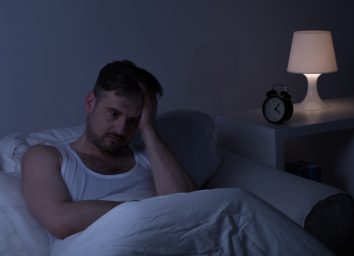This One Thing May Be Ruining Your Sleep, Experts Say

Getting a good night’s sleep benefits your entire well-being in so many ways. Resting comfortably for the right number of hours will re-charge your body and mind, making you feel sharper, more energized, refreshed, and likely happier the next day. Wake up well-rested, and the birds are probably chirping, the sun is shining … but a bad night’s sleep, well, you get the picture. Aside from the obvious, your sleep will impact your overall health, performance, and mood the next day. (Hey, even your car won’t run if it doesn’t get refueled, right?)
The Sleep Foundation notes that not sleeping well could potentially lead to heart disease, diabetes, high blood pressure, and stroke. But don’t fret, because fixing unrestful sleep issues might be easier than you may think.
As a matter of fact, the problem may lie right underneath you—literally. Read on to learn more, and next up, check out The 6 Best Exercises for Strong and Toned Arms in 2022, Trainer Says.
A bad mattress may be the culprit, and here’s why

You might be waking up with body aches or back pain, tossing and turning, sneezing or experiencing sinus pressure, feeling compression on various body parts as you try to get comfortable, or perhaps have a bit of a sinkhole on your side of the bed. Drumroll, please! Sleep Foundation reports these are telltale signs of having a bad mattress that’s depriving you of a good night’s sleep. So, it’s time for a change. After all, it’s been proven by plenty of studies that not getting enough sleep can wreak havoc on your health and potentially lead to depression, anxiety, diabetes, or hypertension.
Generally, sleep specialists suggest that the lifespan of a mattress is 8 to 10 years. Specialists at the UCLA Medical Center even stress, “A mattress that does not fit into the ‘Goldilocks Zone’ of firmness and softness can lead to serious back discomfort in the morning–the type that could ultimately turn into a chronic problem.” Whether it’s the age or style of your mattress, once you’ve identified the issue, you can address it.
Related: Want to Sleep Better? Avoid These Sleep Positions, Say Experts
An expensive mattress doesn’t necessarily offer a restful night’s sleep

Interestingly enough, a higher price point does not necessarily correlate to the most restful sleep. In fact, this sleep study tracked individuals who slept on a varied selection of brand-new mattresses that ranged from low to high price points for a period of 28 days. Each person slept better than they normally do on a new mattress (regardless of price point) compared to the one they’d been using at home. The study suggested that quality of sleep can depend on replacing your mattress in a timely manner.
How to find the right mattress

Experts at The Joint Chiropractic say you shouldn’t choose a mattress that’s very firm, as it can wreak havoc on pressure points, resulting in back issues.
On the other hand, a mattress that’s really soft can cause back discomfort, too, as your body can drop into the mattress like a bit of a sinkhole. It’s advisable to find something smack dab in the middle.
Related: The Best Supplements for Sleep, According to Experts
For more…

For more sleep news, check out Why Do You Always Wake Up in the Middle of the Night? A Sleep Specialist Weighs In and Can’t Sleep? Avoid These 17 Foods That Keep You Up at Night.









